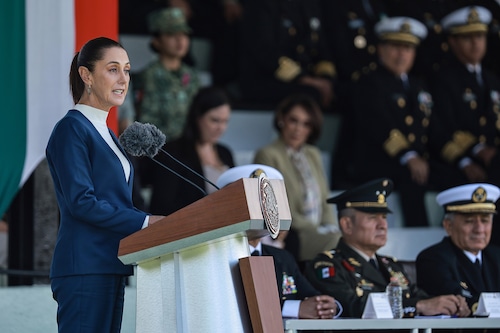By Christopher Sherman and Josh Boak, Associated Press
Washington (AP) Following a meeting with U.S. President Donald Trump, Mexican President Claudia Sheinbaum announced Monday that the proposed tariffs would be paused for a month, according to a White House confirmation.
Sheinbaum wrote on X that Mexico will immediately bolster the northern border with 10,000 National Guard personnel in order to prevent drug trafficking, especially fentanyl, from Mexico to the United States. The US pledges to take action to prevent the flow of powerful weapons to Mexico.
The Mexican president went on to say that the tariffs would be suspended for a month and that the two nations will continue their security and trade discussions.
Trump’s tariffs against China and Canada are still scheduled to take effect on Tuesday, so the pause just heightened the drama. Given that Trump has threatened additional import levies in the future, there is still uncertainty regarding the longevity of any agreements and whether the tariffs are a sign of a wider trade war.
On social media, Trump announced that he had a conversation with Canadian Prime Minister Justin Trudeau Monday morning and would speak with him again at 3:00 PM. Although Mexico is currently delaying, both Canada and Mexico had intended to impose their own tariffs in retaliation for the U.S. measures.
In his social media post on Monday, Trump reiterated his grievances that Canada has not cooperated, despite decades of friendship and collaboration that date back to World War II and the United States’ reaction to the 9/11 terrorist attacks.
Trump wrote, “Canada doesn’t even permit U.S. banks to open or do business there.” What is the purpose of that? There are many such things, but it’s also a drug war, and drugs crossing the Canadian and Mexican borders have killed hundreds of thousands of Americans.
Businesses, consumers, and financial markets are attempting to get ready for the potential additional tariffs. A slight selloff in stock market indices at the start of the day indicated some optimism that the import levies, which have the potential to increase inflation and impede international trade and economy, would not last long.
However, the perspective revealed a great deal of skepticism regarding a Republican president who has spoken eloquently about tariffs and even claimed that the United States government erred in 1913 when it shifted to income taxes as its main source of funding. Although there are no precise standards, Trump stated on Sunday that the tariffs would be lifted if Canada and Mexico took further action to combat fentanyl smuggling and illegal immigration. Additionally, Trump stated that the United States can no longer maintain a trade imbalance with its two biggest trading partners.
While Canada would pay 10% on its energy goods and 25% on its imports to the US, Mexico is subject to a 25% tax. According to the Trump White House, China will be subject to an additional 10% duty because of its involvement in the production and distribution of fentanyl.
Despite the anticipated retaliations and potential for escalation, White House National Economic Council director Kevin Hassett stated Monday that it was inaccurate to refer to the conflict as a trade war.
According to Hassett, read the executive order in which President Trump made it very evident that this is not a trade war. It’s a drug battle.
Trump’s own comments, however, have frequently focused more on his apparent belief that other nations are taking advantage of the United States by running trade surpluses, even if the orders are centered on illegal drugs. Trump declared on Sunday that taxes on EU nations would soon be implemented. He has talked about tariffs as a means of renegotiating current trade agreements, raising money, and using them as a diplomatic tool on matters of national security.
Trump has stated that there will be some short-term pain following his campaign last year on the promise that he could control inflation, and several economists outside the administration have cautioned that the tariffs would raise costs and impede growth.
The United States is not likely to enter a recession this year, according to Joe Brusuelas, chief economist at the consulting firm RSM. However, he said the tariffs will hinder growth and increase the cost of borrowing for the government, which might maintain high interest rates on mortgages and auto loans.
According to him, the U.S. economy will be severely impacted if there is no resolution. As inflation and interest rates increase, growth will significantly decrease from the 2.9% average over the previous three years. The 10-year Treasury yield, which is currently at 4.5%, may increase to a range of 4.75% to 5%.
__
From Mexico City, Sherman provided a report.

